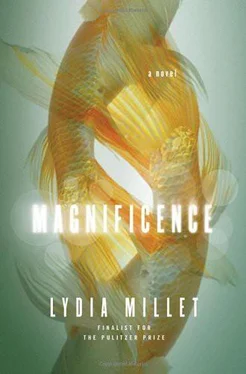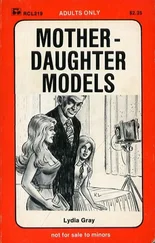Here it was lush, there was a hidden splendor. To the ones that had it, anyway: minutes ago she had been on the other side of the line, now she was here. A minute ago she might have hated who she was now. This sumptuous luxury.
The real selfishness, she thought, the only real selfishness was wealth like this. The commandeering of places, their fencing in, the building of palaces there — arches, gardens. No other selfishness mattered. All other selfishness was petty, as tiny as blown dust.
Her heart was beating fast, her cheeks were hot though she shivered when a breeze passed through the branches. She disbelieved it, then she couldn’t help herself. She was filled with elation.
Susan invited Casey to the big house and Casey nodded and mumbled assent but didn’t show up. Her grief seemed to be shifting to melancholy — lighter and less oppressive, though still she was prone to sudden retreat: she would be talking or doing routine tasks and then fall silent. Many days she continued much as before, at least on the surface.
Often when Susan got to her apartment T. was there, cleaning or fixing things or putting away groceries. He carried Hal’s boxes in, arranged them neatly in a closet; he ferried Casey back and forth to his mother’s place. Apparently Casey was curiously fond of Mrs. Stern, who remembered almost nothing from one day to the next. Susan felt a pang that her daughter chose to spend so much time with another mother, as though the two of them were in competition for her affections — she and a woman with no memory, a faded blond dowager from Connecticut who showed every sign of presenile dementia. Who, by the way, was blissfully competing with no one, while Susan had to work to pin down her daughter for dinner despite the fact that they were both bereft. Still it was good for Casey to spend her time with someone worse off than herself, Susan thought — she had to be grateful for any straws Casey could cling to. She tried to suppress her jealousy.
Before the closing with the buyers she and Casey and T. drove over to the old house. Opening the familiar front door, she thought how shabby this place was compared to the big house in Pasadena, this place where they’d spent all those years — a humble bungalow with no pretensions. With the furnishings gone it was a stack of boxes with hardwood floors and creamy walls, the wood pocked and scarred but still giving a tawny glow. T. pushed Casey’s chair through the empty rooms as she looked around, Susan lagging behind.
Without their belongings it could be any house, any house where once a family had lived. Was there even a trace of them here? Only the appliances. Their appliances had been left behind. But it was hard to get teary about an appliance. Although she did remember shopping for them — the washing machine and dryer at Sears, the dishwasher later, when they had more money. For most of her life she’d washed dishes by hand. They’d bought the dishwasher in the evening of a day in which, bored and listless, she’d met a man named Najeem in a motel room that had indoor-outdoor carpeting (she remembered it still, a muddy brown flecked with yellow) and he turned out to be gay. She and Hal had been slaphappy that day, both of them, hysterical with laughter for their own unknown reasons. She would never be sure whether Hal had caught her hysteria or had his own wellspring. It could be ambient; hysteria caught like a yawn, that was clear, hysterics and yawns had their contagion in common.
Outside the mall, in the parking lot, they had run hard, chasing each other, and laughed even harder when she fell, surprising themselves. To this day she had a line of black dirt embedded in the skin of one knee.
This was where they’d been living earlier too, when the accident happened. Susan had got the call here, standing in the kitchen, and this was the space they’d adapted to accommodate the wheelchair, before Casey told them she wanted to move out. It had worn wooden ramps on the ground floor, to the elevated section that held Casey’s bedroom.
Susan left her daughter and T. staring out the bare window at the next-door backyard, where a kid was creaking slowly back and forth on a yellow swing set. She made her way upstairs and stood silently in the empty master bedroom.
She and Hal had slept here together for years. Once, only once, had she let someone else in. Fantasy Baseball. The memory made her wince.
She stood still, wondering how sharply she would feel the rising tide of shame. She had never expected Hal to die young. She had assumed they would be old together, absentminded, dreamy and tottering. She had hardly ever thought of it, but when she did she saw them — a bit sadly, a bit nostalgic beforehand for the youth they had lost — nodding while quiet music played from dimly lit alcoves, drinking strong cocktails every night or watching the sunset, say, from the verandah of a restaurant — the games of children long forgotten by then. The selfishness of their youth left behind with their looks. That was how it would be, she used to think, when one of them finally left.
While he was alive she’d never felt squalid. Alive he had given a resilience to the fabric of things, his dry humor had warmed the rooms. But this was his death, its painful sanctity. Its coldness.
God damn. Death made everything serious.
This gray severity was the hard part — the punishment for her lifestyle, her callous practice of adultery, as a friend had put it once. Only three of her friends had known, and one had moved long since to New Zealand from where, every two or three years, she sent a postcard of craggy mountains and wild meadows, green ridges towering over a blue sea. The other two were more gone than that — one had succumbed to cancer in her forties, the last to manic depression and a group home in Northern California, not far from the ancient redwoods. . faces blended and faded, their features more and more obscure.
That was the abstract cost of this, the cost beyond Hal’s death: his memory was compromised. What should be a full and vivid remembrance of him was fractured by her separate life and blame — her separate life infringing on the life they had, the history he deserved to own.
The queen-size bed that had stood here might well have been the origin of his dying. She closed her eyes and saw the bed again, its sheets and blankets in disarray. She’d been careless here once, just once, with Fantasy Baseball. She had no way of knowing, of course, that Hal would have a minor car accident and appear at the house in the middle of the day, when she was still washing off in the shower. She had brazened it out, pretended there was nothing to acknowledge, and Hal had seemed to go along — but then soon after that he’d known, too soon for pure coincidence.
She should have erred on the safe side and never brought Baseball here. It had not been her practice to bring men home. Pure laziness: Baseball’s apartment, where they usually went, was at Fairfax and Wilshire and she’d wanted to avoid the lunch-hour traffic. And she was not in the mood for the apartment’s frat-boy furnishings, free weights on a vinyl bench, neon Budweiser sign and running shoes tumbled in a pile near the door with dirty socks crumpled into them.
That it was Baseball, with his stolid lack of foreplay and solid grasp of box scores, kept multiplying the offense, but the fact remained that she was sorry for symptoms, sorry for side effects most of all. Not for all of it, only what slid off the rails. It could not be her fault and all of it was her fault. She was a murderer and a victim, she felt the strain of trying to find her footing on uneven ground. Then also she was changeable, prepared to be someone else. She had fluidity.
She said goodbye to Hal again. She had left him once in the casket, once at the funeral and now in the bedroom. She would leave him again, she suspected, hundreds of times in near-invisible gestures, like the blur of a moving limb in a photograph.
Читать дальше












